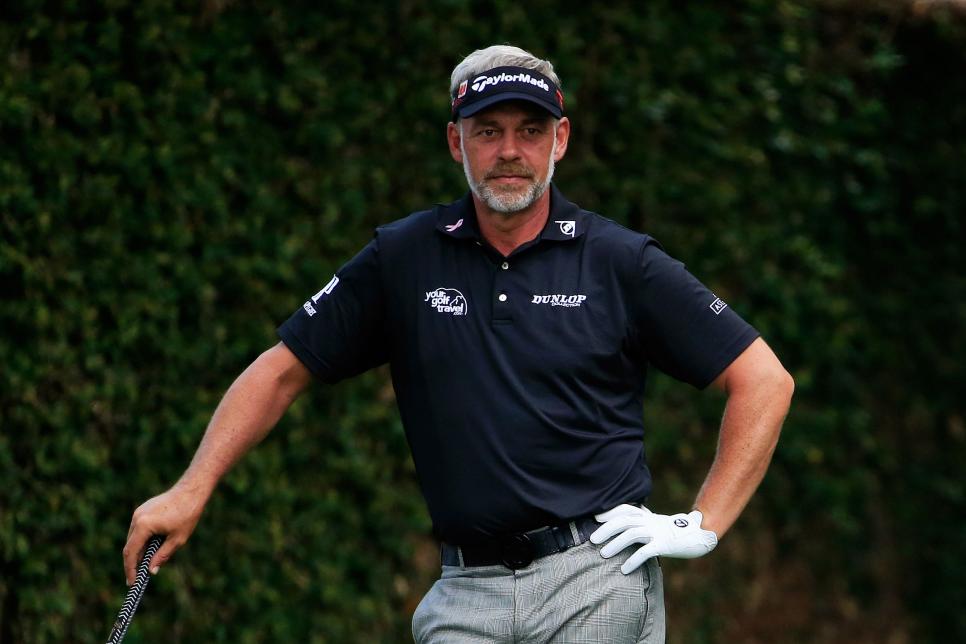Darren Clarke was amused by the inquiry. Or at least by the attempted diplomacy of his questioner.
“I like the way you said, ‘This is the last year of your Masters exemption’ rather than, ‘This is the last year you’re going to be here,’ ” laughed the 2011 British Open champion. “But that’s OK. I know my form over the last couple of years hasn’t been nearly good enough. Which is partly why I’m not feeling particularly emotional about this maybe being my last time at Augusta National. It is a special place to be. But if this is it for me, then so be it.”
There is another obvious reason Clarke might not be all that sentimental, specifically his task to lead the 2016 European Ryder Cup team this September at Hazeltine National. “I have other things on my mind,” Clarke admitted. “I haven’t exactly been focusing on my own play over the last few months. I’ve been watching more golf than playing it. But that goes with my job. I knew that would be the case when I accepted the role of Ryder Cup captain.”
Clarke’s Masters record is disappointing, particularly for someone so gifted in the art of creating and shaping golf shots. Only once in 13 previous appearances has he finished in the top 10: a tie for eighth in his Masters debut in 1998. Only 12 times in 44 rounds has he broken par. And his scoring average of 73.34—with a low of 66 and a high of 83—is mediocre at best for a man good enough to win multiple World Golf Championships as well as the game’s most historic event.
“While the course appeals to the creative side of my golfing nature, my awareness of where not to go has held me back,” said the 47-year-old Northern Irishman. “I’ve never been able to just go out there and have a right go. All of which is not like me. But playing smart has never been one of my strong points, either. And when you start going for flags you shouldn’t go for, it can be a problem.
“You are on the edge of a double bogey on every hole here, without hitting a bad shot,” Clarke lamented. “There are a lot of numbers in play before you even make a mistake. If you hit the wrong side of a slope, you are walking up the fairway wondering how you are not going to make double. That’s not my style of play. It’s foreign to me. I’ve never been able to adapt to it.”
Clarke is hardly alone in that. Recently, his Old World compatriots have also struggled to make the ultimate impression amid the Georgia pines. Not since 1999, when José Maria Olazábal donned his second green jacket, has a European golfer finished first in the Masters. All of which is in complete contrast to the last 20 years of the 20th century. Between 1980 and ’99, six Europeans—Seve Ballesteros, Bernhard Langer, Sandy Lyle, Nick Faldo, Ian Woosnam and Olazábal—won 11 times at Augusta National.
“It’s a conundrum, one difficult to explain,” Clarke shrugged. “It’s not as if we haven’t had our share of world-class golfers. Why they haven’t succeeded here, I have no idea. Rory [McIlroy] should feature every year. His game is made for this course. And look at Justin Rose. His Masters record is sensational. But, on the other hand, this is the place where Sergio [Garcia] thinks he can never win.”
It seems certain that Clarke is destined to have a similar Masters fate. Victory here this week is, to put it mildly, a long way off. But he is determined to enjoy the experience.
“I’m not going to lie, there won’t be any tears shed when I walk up the 18th fairway on Friday or Sunday,” Clarke said. “I don’t dislike the course. But the margins of error are very fine here. And I haven’t coped well with that fact. Too often I got my ambitions and my capabilities mixed up.
“Maybe that’s the best way to describe my Masters experience.”
Editor's Note: This story first appeared in the April 6 issue of Golf World Daily from the Masters.
